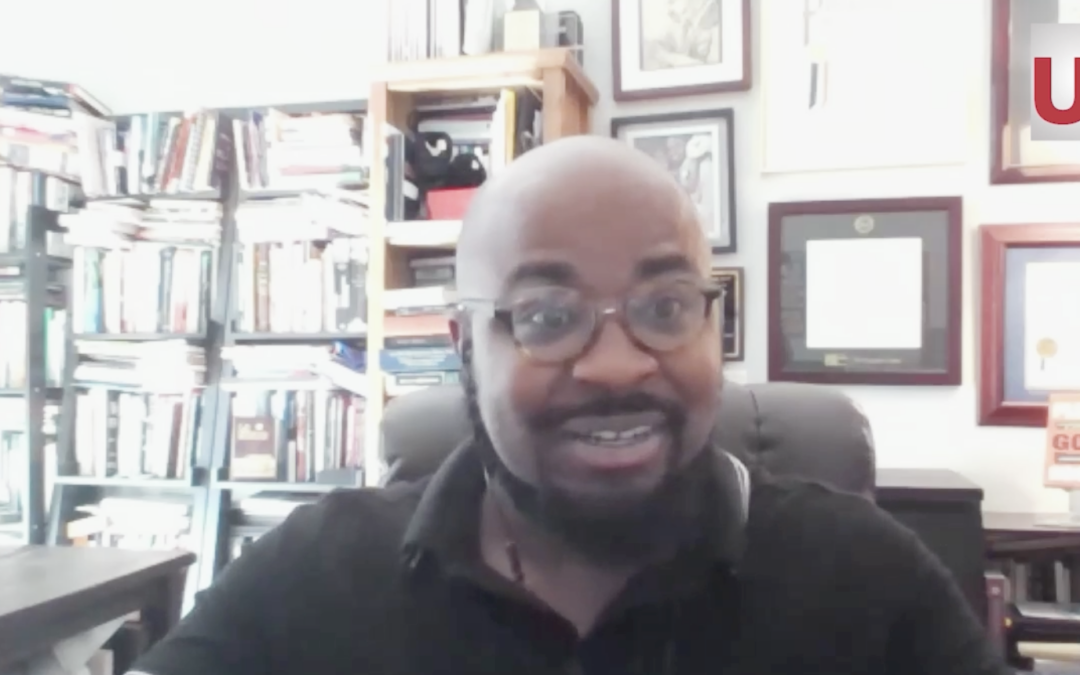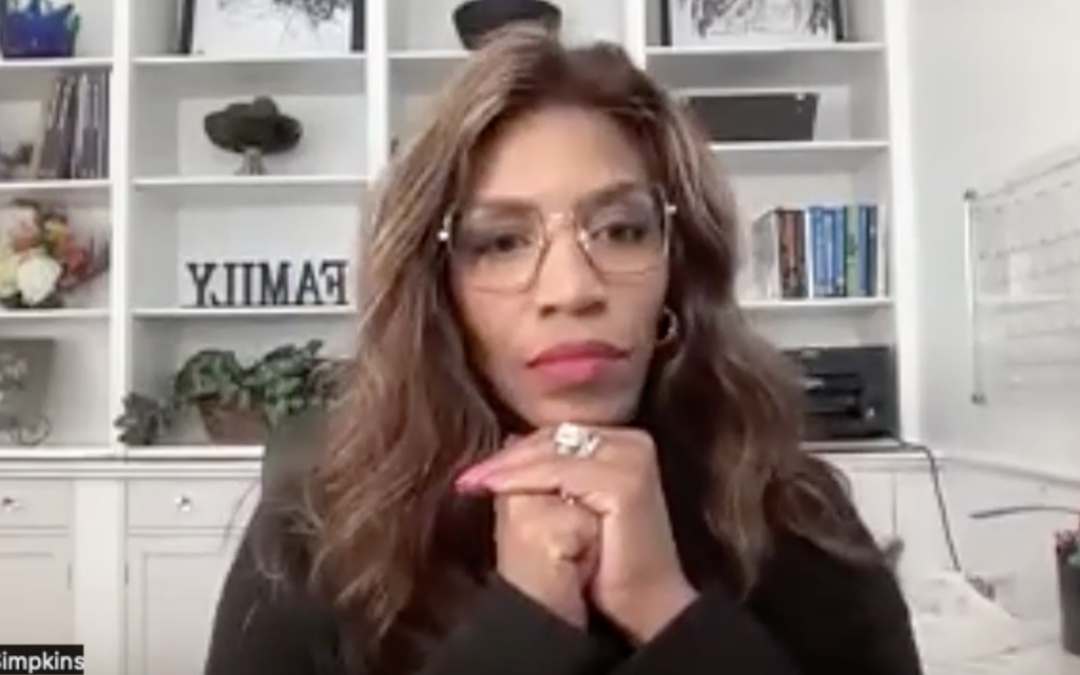
Plenty Good Room: UrbanFaith x Rev. Dr. Andrew Wilkes
The full interview is above. Excerpts from the interview are below. Dr. Wilkes book Plenty Good Room is available for purchase here.
Allen
We have the Reverend Dr. Andrew Wilkes talking about his book today Plenty Good Room. He has written for us in the past many years ago as an intern, but now continuing his work as a political scientist, social thinker, and a pastor.
Dr. Andrew Wilkes
It’s good to see you, Allen, a joy to be in conversation, deep appreciation for Urban Faith and of course for the wider work beginning in the 70s of knowing Black folk need Black authored materials for Christian Education that are culturally relevant that you and I has been doing all down through the years.
Allen
Why did you feel like you wanted to write this and get your thoughts out in Plenty Good Room?
Dr. Andrew Wilkes
Yeah, really appreciate the question. Plenty Good Room, as I note in the preface, is part argument, part appeal, part prayer. And it’s something that I’ve been pulling together for the last 10 years or so, went through research and other means that I noted that so much of our approach to economics is still grounded on a mental model, a planning model of scarcity and austerity, rather than a beginning operating assumption of sufficiency and abundance. And so the prayer, the appeal, the argument is that if we’re in a moment where, let’s take America for instance, where we have gross domestic product of some $26 trillion, whatever we have, it’s not scarcity and it’s not austerity. We’re in a place where we have to think through the public choices and the public priorities that we make. And so Plenty Good Room is trying to argue that public choices and public policy is not simply a technical consideration for experts, but it’s rather an encompassing matter for the full body of Christ, for everybody that considers themselves to be a neighbor, or somehow enmeshed exactly as you named in this work of trying to create a better world.
Allen
A lot of folks may have heard of socialism. We certainly have black Christians. Can you define black Christian socialism for us?
Dr. Andrew Wilkes
Yeah, so I’d like to define it by image, because I think that’s helpful. Black folk play spades and when you play spades, you have a hand. And we tend to think that the hand that somebody plays with and wins depends on the skill or the savvy of the person who’s playing their particular hand. But what really is the meat and potatoes and often the most influential factor is the distribution of cars that one has in their hand. Do you have the Joker? Do you have the deuce of diamonds or the deuce of spades depending on how you play? I know black folk plays spades differently in different regions, but the question of distribution is co-equal to in some cases more important than the individual skill of the spades player. And you may have perhaps heard those who are listening may have perhaps heard folks say, I can’t even do nothing with this hand right here. And so, I talk about spades as a way to get the question of distribution and black person socialism on the table, because too often the question of what it means to be a justice-oriented Christian devolves into a kind of budget shaming or financial scolding of how folks save, invest, spend or how they don’t. Rather than having a question about how are we co-creating and distributing the resources in a context where we affirm that the earth is the Lord’s and the fullness thereof. And so, in a nutshell, black Christian socialism is about trying to pay more attention to the pre distribution and the redistribution of resources so that all of God’s children can flourish and help make decisions about stuff they help create.
Allen
I love that image. And one of the things that you lift in the pre-distribution but also in thinking about what has happened before us as you spend some time with history and I think it’s important for people to see that this is not new stuff, right. The ideas are rooted in our traditions.
Dr. Andrew Wilkes
Very much so.
Allen
Can you talk about some of that history, some of those figures you lift up, you know, Dr King and bell hooks and, and, you know, can you talk about some of why that history is important and where the historical precedence is for something like this, this black Christian socialism?
Dr. Andrew Wilkes
Absolutely. You know, in 1896 in the middle of trying to figure out how industrial capitalism and in a moment before public health codes and building codes whereas modernized as they are now, you have a Reverend Dee Ransom, who’s pastoring a church in Chicago, no, no less in the institutional and me church later to become an AME bishop, who writes in an 1896 edition of the AME church review about Christians and socialism. You have a black bishop in the Episcopal church, the door Holly, who in that same issue. Again, this is, you know, 140 years or so, prior to our current moment addressing the same and they talk about the values and the virtues of the carpenter from Galilee and how questions of socialism and Christianity need to be on the table as we think about what it means to express a kind of discipleship, civic responsibility, agitation for justice that can fully serve black people and so in terms of the history. I point out the fact that it’s not just individual outlier clergy, but this is a denominational church press, which is talking about black churches and socialism. And on just a plain level. I think it’s important to open up the continuum of optionality for Christians that there is no inherent marriage and in fact I’d argue there’s some a good deal of antagonism between Christians and Christianity as a religious tradition and capitalism. Even if one doesn’t buy that premise, certainly Christians should be able to choose the political economy that they feel best matches their vision of what Christ’s message in ministry is all about. And what I’m simply saying is that I think we need to see that the radical stream of black social Christianity has always existed and has turned towards things like mutual aid and socialism to express what it looks like to turn the world upside down.
Allen
You can’t read Acts right you can’t read Acts 2 and Acts 4 and not see this. Can you talk about some of those biblical foundations, especially for people who may not be as familiar or may have not read those scriptures? Can you talk about how that’s rooted in our faith and rooted in scripture?
Dr. Andrew Wilkes
Absolutely. Beautiful question. You know I think about a number of places we see Jesus and Luke 4 talking about how the Spirit of Lord is upon me to preach good news to the poor to bind up the broken hearted to set the captives free announce the acceptable year of the Lord’s favor. But we often miss Luke chapter one, Mary’s Magnificent where she talks about the humble being exalted, the mighty pulled down from their thrones, the rich being sent away empty and the hungry being filled with with good things, whatever that correlates to it certainly doesn’t correlate to Silicon Valley Wall Street dominated capitalism. When we look at the vision of what I think we can interpret our current moment not saying this was the concern of the office but in terms of our current moment acts to and for talks about a fellowship dedicated to the teaching of the Apostles and folks sharing all things in common. And so we have this cooperative pooling together of resources that we see as contemporary as black churches creating credit units to get away from predatory finance systems that wouldn’t give fair loans or gave predatory loans to black people like folks that wait, wait, wait, we can pull our resources together. We can have membership in a financial entity where we can resist white supremacist notions of credit worthiness and instead do what the best of church traditions have done as canonizing scripture, but also as practice by our people down through the years and so I think credit unions are one way to live into that and so we can do and for tradition. But there’s also a sense of wanting to have a comprehensive vision of economic justice and when I think of a passage like James five, which is a sim essentially a manifesto against wage theft. And so this is about how farmers farm workers had wages withheld from this. This is James words that my from from the rich and the text says that the wages cried out and that the Lord of Hosts, her. This is a kind of a caring through of that kind of Exodus 3 of God hearing the cries of folks who experienced economic oppression, and the church men called to do something about that. In a nutshell, Allen, what I am suggesting is that a model of what some economists and sociologists have called solidarity economics is a way to try to translate this beloved community, this co creating tradition that we see in the scriptures. This way we can translate that into how we do public finance, how we do nonprofit work, how we do community development, how the church engages with labor unions, and how we can think beyond the two party system in America because multi party democracy is a common thing for churches and most of God’s creation, it ought to be something that we do here in the States as well.
Allen
How can people join into these conversations or do some things on the ground to make this implemented because it is something that’s actually possible now that’s being done now?
Dr. Andrew Wilkes
Absolutely. So, a few things. I mean, on the policy front, we’ve talked a bit about calling for supporting already existing credit unions with respect to finance community land trust with respect to housing. Solid wealth funds that are democratically controlled with respect to economic development models and rural metropolitan suburban and exurban areas, calling for the use of taxation policies that prioritizes families that are rather that prioritizes working families rather than tax abatement strategies in perpetuity to build stadiums that project jobs which I’ve never quite created at the volume and at the pay rates that the models say will take places. I think there’s a way to participate specifically and land use zoning and town planning conversation that says how can we use the fiscal leverage that the public sector has in a way to generate full employment in our communities and a way to generate more catalytic investment from nonprofits from small businesses from arts and cultural institutions which are often unheralded economic drivers in terms of the demand that they bring to cities through concerts through forum through symposium. Anytime you talk about stimulating consumer demand and bringing people to an area that’s an economic impact that should be seen as such and not explained away because it may not be, you know, a cash cow in the way that say a high profit yield tech industry is. So, my point in saying that last piece and talking about equitable forms and models of economic development and getting people involved, not just in voting, but in planning conversations and city council meetings, calling for things like public banks. That is the way on the policy front that I think we can start to activate and make more actionable what may feel like a big conversation. The other piece that I’d say and I think there’s a theological piece to this explicitly that I want to name. I think it’s important to add more detail to the vision of what often goes by beloved community but so many things have been described as beloved community or social justice. And when you scratch below the surface, it’s the vision of economic empowerment for those who are already well connected, well degreed, well spoken, and those whose new divergence or whose multi-lingual gifts or who’s not quite being at the center of social status and power isn’t quite as central to those visions. I think it’s important for us to recognize that gap and then be to draw from some of our most famous and heralded figures. Martin Luther King Junior is and was known by his colleagues as a Democratic socialist to draw on late Reverend Dr. Katie Geneva Cannon, who in womanism and the soul of community. It’s drawing on the work of Oliver Cox to make a very similar point. The take home being that when we think of what it means to do justice, love mercy and walk humbly with God, the 21st century expression of that is to work in politics, to work in economics, to work for nonprofits, to work in unmet need round tables that do mutual aid. Right, because it’s not inherently turning towards government. There may be some, not maybe there are ways to distribute resources and a philanthropic and like peer to peer with that can also cause justice. And so what I’m simply saying, Allen, is that, and I know I’m taking the scenic route. Now I’m going to land the plane. The being a systems change sustainably minded Christian who’s concerned about justice, not for an election cycle and not just for the temporary upswing in a business cycle, I think has to mean that that some kind of socialism or cooperative expression is a viable consideration.
Allen
What advice would you give to younger believers about how they can try to live into a more just economy politics world that you have studied and see playing out ?
Dr. Andrew Wilkes
The first place that that go is to is to take a comprehensive, consistent and consecrated view of everything you’ve studied, including scripture, but not ending with scripture. And I’m inspired by the pause letter to the church of Philippi where he says, you know, whatsoever is good whatsoever is pleasing whatsoever is lovely whatsoever is just whatsoever is essentially virtuous thing on these things. And so that that call to consistently study to think to research, certainly is a call to dig deeply into the canon of scripture. But I think it’s equally a call to think through what does justice mean in terms of political science what does it mean in terms of the different institutions that shape identity and community that will take you to sociology What does it mean in terms of psychology what does it mean in terms of reading the newspaper consistently and beyond just Fox CNN and MSNBC like once in the local newspaper and neighborhood weekly. So that one can get a sense of how public affairs plays out in your immediate environment as well as meetings and pre existing convenings there’s almost always somebody working on what you care about exactly where you are that you just may not know about and so the call to study the call to see what’s already working and to presume that you want the only one that God has spoken to and stirred up for justice. So, the call to lock arms and join in Federation with folk who are trying to do God’s work of renewal and of making those who are too often put last in our society put first.






 Have you ever felt like you didn’t fit in because of God’s call on your life? Tired of the boxes for living faithfully that institutions and society have put on us? Want to be authentic and impactful in the work that you do?
Have you ever felt like you didn’t fit in because of God’s call on your life? Tired of the boxes for living faithfully that institutions and society have put on us? Want to be authentic and impactful in the work that you do?  In the changing world of ministry and leadership, the demand for authentic leaders has never been more vital. “
In the changing world of ministry and leadership, the demand for authentic leaders has never been more vital. “
 25 year-old Aaron Cole started rapping when he was just three years old. Since then, he’s garnered the coveted Dove Award for New Artist of the Year, held 3 #1 singles on the Billboard Christian HOT AC/CHR chart and has had multiple sync uses including promos for ESPN and Fox Sports. His songs have also been featured in the Netflix original series, “On My Block” among other prominent sync placements.
25 year-old Aaron Cole started rapping when he was just three years old. Since then, he’s garnered the coveted Dove Award for New Artist of the Year, held 3 #1 singles on the Billboard Christian HOT AC/CHR chart and has had multiple sync uses including promos for ESPN and Fox Sports. His songs have also been featured in the Netflix original series, “On My Block” among other prominent sync placements.
